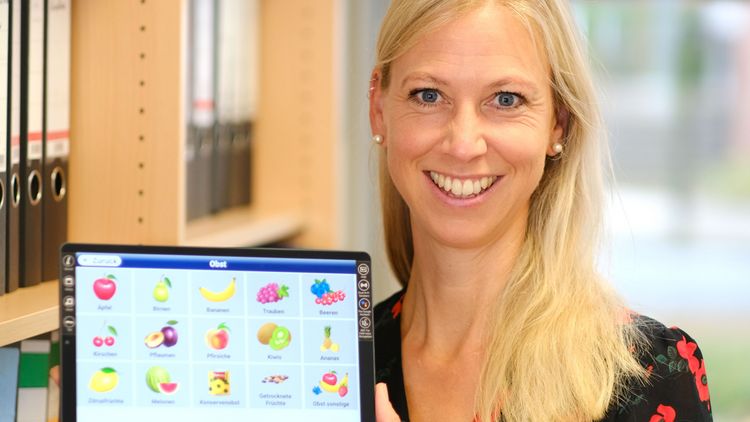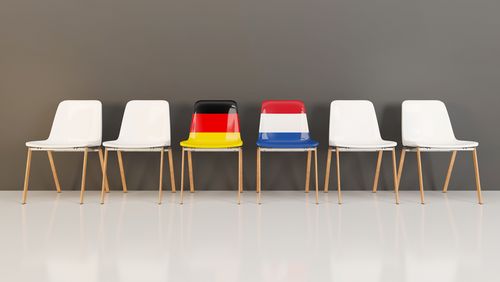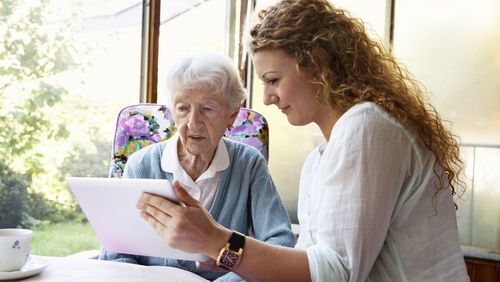Old people and modern technology don’t work well together? Nutritionist Rebecca Diekmann disagrees. She and her team design an app-based system to help this demographic live healthier lives and remain independent.
Three metres. That’s the distance be-tween the chair and the mark on the floor. As soon as the person sitting in the chair grips the armrests with their hands and pushes their body up from the seat, the timer starts running – and it doesn’t stop until they have crossed the mark, turned around and walked back to resume their original sitting position.
The amount of time this procedure takes provides information about the individual’s mobility levels. If it takes less than ten seconds, there’s no need to worry. Anyone who needs longer than 20 seconds should get their physical function, muscle strength, and balance checked.
With its strict emphasis on performance and times, the Timed Up and Go Test (TUG test) exercise is reminiscent of physical education at school, with the difference that it is generally performed by elderly people rather than schoolchildren. This geriatric mobility test reveals how steady and agile a person is on their feet and how their mobility levels progress over time. “To stay fit and live independently in our own homes is something we probably all wish for,” Dr Rebecca Diekmann says.
Ideas that complement each other
It is this independence that the nutritionist wants to help senior citizens preserve. Diekmann heads the junior research group Nutrition and Physical Function in Older Adults at the University of Oldenburg’s Department of Health Services Research. The team brings together eight researchers from computer science, medical engineering, nutritional science, medicine, and physiotherapy to develop technical tools to help older people stay healthy.
One of the projects it is currently working on is a tablet-based app that helps older people to eat a healthy diet and maintain mobility. The group is also planning to develop measuring and training stations where test subjects can do physiotherapeutic exercises and document their progress without help from others. The assistance system that the researchers will be developing over the next few years will integrate the complementary concepts of a mobile tablet app and permanently in-stalled training stations in public areas.
They won't start from scratch, but build on previous projects. As part of their Prediction for Maintaining Independence in Old Age project, for example, the researchers already developed and used technology to get older people moving and measure their performance. Instead of relying on medical personnel to check that they stick to the rules and to keep a record of times in exercises such as the TUG test, cameras and various types of sensors monitored these tasks.
Reduced appetite and decreasing energy requirements can lead to poor nutrition
But exercise and training alone don’t guarantee success. One commonly overlooked prerequisite for retaining mobility into old age is the knowledge on right diet. “For example, it’s impossible to build muscles if your protein intake is too low,” Diekmann explains. Malnutrition is a common problem among the elderly. As they grow older their total energy requirements and appetite decrease. As a result, they eat about 20 percent less on average, which means that the supply of essential nutrients also falls short – but this often goes unnoticed.
App gives overview of nutrient requirements
The app-based assistance system is designed to to make older adults aware of how to maintain a balanced diet. They provide all the key data themselves, entering all the meals and snacks they eat over the day on a tablet computer. “We’re not interested in every last detail; it’s more about a rough assessment of whether nutritional requirements are met,” Diekmann explains.
The app calculates how much of the nutrient requirements are already covered and informs the user. Diekmann’s team has been steadily expanding the app’s functions over the years, and it now includes videos of simple mobility exercises, to-do lists for sports activities and general information dispelling common myths about nutrition.
Psychology is also important
Diekmann recently got the green light for her AS-Tra project. A five-year grant from the Federal Ministry of Education and Research will allow the scientist and her team to further improve the system and put it to the evaluation. “This is our big chance to conduct a randomised controlled trial and evaluate the effectiveness of the assistance system,” Diekmann says. Before this step she and her team plan to integrate a psychological model into the system to help keep users motivated.
The Transtheoretical Model of Behaviour Change describes the various phases involved in changing a behaviour permanently. The app will use this model to adjust content according to factors such as whether the user has never shown any interest in nutrition or exercise before, whether they are starting to think about adopting a healthier lifestyle or whether they have already undertaken initial steps in this direction. “It makes no sense to suggest exercises to someone who still has no idea why this is good for them,” Diekmann explains.
Yet in old age in particular, adopting a healthier lifestyle pays off and can lead to quantifiable improvements, for example in the TUG test. But instead of getting good grades at school one gets a better chance to live independently for longer.






